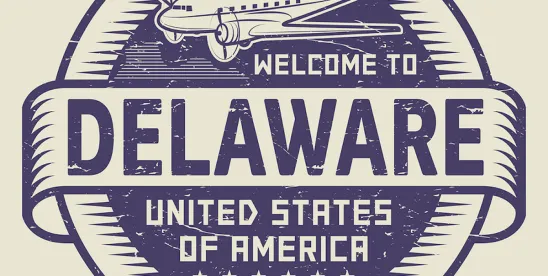As you know from our prior alerts, creditors of borrowers formed as Delaware LLCs (as opposed to corporations) lack standing under Delaware law to sue directors for breaching fiduciary duties even when, to the surprise of many, the LLC is insolvent. See our prior Alert. The disparity of substantive creditor rights depending entirely on corporate form results from two aspects of Delaware law. First, the Delaware Supreme Court has held that directors owe fiduciary duties to the corporation and, upon insolvency, those duties can be enforced by bringing a so-called “derivative action” (as distinct from a direct action) where the creditors sue on the corporation’s behalf. Second, Section 18-1002 of the Delaware Limited Liability Company Act (“LLC Act”) creates a statutory right only for LLC members and their assignees to bring a derivative action on behalf of an LLC. This means creditors of an insolvent LLC cannot sue directors for breaching fiduciary duties. Instead, creditors must rely on remedies like breach of contract and fraudulent transfer under state law which are both direct claims (as opposed to derivative claims).
So what happens when an insolvent LLC files bankruptcy? More questions are raised, as there is tension between the LLC Act and the Bankruptcy Code in at least two respects.
- Fiduciary Duty Claims. Does the LLC Act prohibit individual creditors or a statutory creditors’ committee (a “Creditors’ Committee”) from seeking derivative standing from the Bankruptcy Court to prosecute fiduciary duty claims?
- Fraudulent Transfer Claims. Does the LLC Act prohibit individual creditors or a Creditors’ Committee from seeking derivative standing from the Bankruptcy Court to prosecute fraudulent transfer claims which, upon the bankruptcy filing, are vested in the estate and can be pursued only by the debtor, a trustee or a third party by way of derivative action?[1]
The answer is unclear because we now have two bankruptcy court decisions that have reached opposite conclusions. In In re Ector County Energy Center LLC, Judge John Dorsey of the Delaware Bankruptcy Court denied an individual creditor derivative standing to pursue breach of fiduciary duty and fraudulent transfer claims based on the LLC Act. In Ector, the debtor’s largest unsecured creditor sought standing to pursue derivative claims on behalf of the LLC debtor’s estate to (a) avoid $75 million in debt allegedly incurred for little value on the eve of bankruptcy while the debtor was insolvent, (b) recover damages for insider breaches of fiduciary obligations and (c) avoid insider preferences. The plaintiff creditor argued that its standing to prosecute derivative claims is governed by the Bankruptcy Code and federal common law, not Delaware state LLC law. It argued that the LLC Act addressed “derivative actions” in the “Delaware court” on “behalf of an LLC.” Here, the creditor argued it was seeking authority under the Bankruptcy Court’s equitable powers to act on behalf of the bankruptcy estate and to stand in the shoes of the trustee under the Bankruptcy Code and in the Bankruptcy Court. But to no avail. In an unwritten bench decision denying the motion, the Bankruptcy Court held that creditors are prohibited from asserting derivative claims on behalf of a Delaware LLC under the LLC Act, which only allows such claims to be pursued by LLC members or their assignees. The Bankruptcy Court also rejected the argument that the Bankruptcy Code and the applicable Third Circuit case on derivative standing overrode the Delaware statute. Finally, the Bankruptcy Court, like the Delaware Supreme Court in Gheewalla, determined that creditors have other adequate means of seeking legal redress, including seeking the appointment of a chapter 11 trustee or having the case converted to chapter 7.
In a decision earlier this month, Judge Craig Goldblatt of the Delaware Bankruptcy Court reached the exact opposite conclusion in In re Pack Liquidating, LLC and held that the LLC Act did not bar granting derivative standing to a Creditors’ Committee to prosecute breach of fiduciary duty claims. Judge Goldblatt reasoned that estate causes of action (described by Judge Goldblatt as “Cybergenics actions”) and state-law derivative actions are “simply two different kinds of creatures,” with the power to bring Cybergenics actions derived from the Bankruptcy Code, not state law. Therefore, “limitations on state-law derivative actions have no application to a Cybergenics action.” Alternatively, he found, the Bankruptcy Code and Cybergenics—as federal law—override the state law where there is a conflict, and therefore the Bankruptcy Court is empowered to grant derivative standing notwithstanding the LLC Act. In other words, the LLC Act cannot be used as a shield against derivative actions (including breach of fiduciary duty or fraudulent transfer) in the context of a bankruptcy case.
In light of the split in Delaware, many LLCs and their creditors now face significant uncertainty regarding the relative risks and leverage resulting from a bankruptcy filing. While the governance documentation of many LLCs includes fiduciary duty waivers, Judge Goldblatt’s decision exposes a chink in the LLC armor. We will continue to monitor the case and any others involving the same issue, as we do not expect this to be the last word on the topic.
__________________
[1] See, e.g., Official Comm. of Unsecured Creditors of Cybergenics Corp. ex rel. Cybergenics Corp. v. Chinery, 330 F.3d 548, 568, 580 (3d Cir. 2003) (“In § 544(b), Congress made clear that it intended for the estate to recover property fraudulently transferred by the debtor. The mechanism Congress designed to ensure this recovery was to vest in the trustee (or the debtor-in-possession) both the power to bring an avoidance action and the duty to bring one if it would likely benefit the estate.” The Third Circuit also determined that “bankruptcy courts can authorize creditors’ committees to sue derivatively to avoid fraudulent transfers for the benefit of the estate.”). See also Nat’l Tax Credit Partners v. Havlik, 20 F.3d 705, 708–09 (7th Cir. 1994) (“[T]he right to recoup a fraudulent conveyance, which outside of bankruptcy may be invoked by a creditor, is the property of the estate that only a trustee or debtor in possession may pursue once a bankruptcy is under way.”).






 />i
/>i

